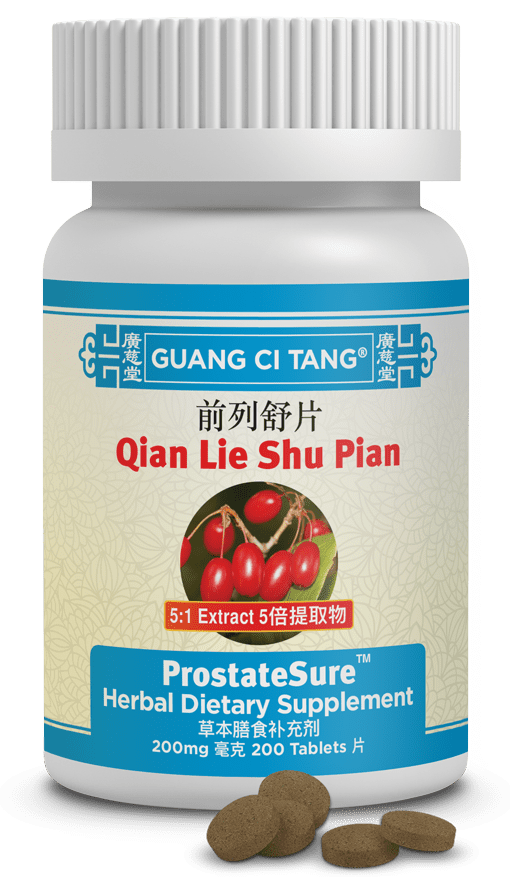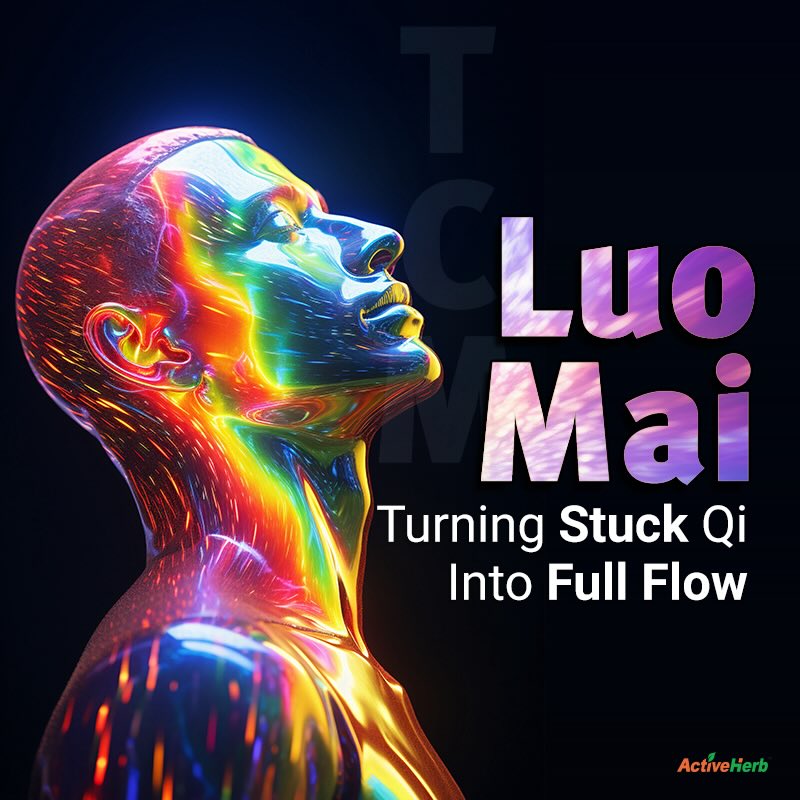TCM Prostate Support: With Prostate Problems In The Headlines, Here’s What Every Man Should Know

Prostate health is back in the national spotlight. Here’s what every man should know…
With the recent news concerning former President Joe Biden, prostate health is a major talking point. For many men, prostate issues begin long before any formal diagnosis. In this post, we’ll review how Traditional Chinese Medicine (TCM) has understood and supported prostate health for centuries. From classical syndrome patterns to modern formulas like Qian Lie Shu Pian, discover a holistic way to maintain prostate wellness.
The Prostate: What’s in a Name?
Let’s start with a surprising fact: the word prostate comes from the Greek prostatēs, meaning “one who stands before” or “protector.” Anatomically, the prostate “stands before” the bladder—yet in modern times, many men don’t even know it’s there until it causes trouble.
There’s little record of the prostate in ancient medical texts from Europe or Asia—not because the ancients ignored it, but likely because life expectancy rarely stretched into the prostate-problem decades. Instead, ancient physicians described symptoms that today we’d associate with prostate enlargement or dysfunction: frequent nighttime urination, difficulty initiating urination, and weak urinary stream.
Prostate Problems: The Good, The Bad, and The Scary
When the White House announced that President Joe Biden had been diagnosed with stage 4 prostate cancer, the nation took notice. Stage 4 indicates that the cancer has spread, often to the bones. The news once again raised awareness of just how common this disease is.
According to the American Cancer Society:
- 1 in 8 men will be diagnosed with prostate cancer during his lifetime.
- Roughly 299,010 new cases are expected in the U.S. this year alone.
- About 35,250 men will die from it in 2024.
- When caught early (stage I or II), the 5-year survival rate is close to 100%.
- For stage 4, that number plummets to about 30%.
Unlike other cancers, prostate cancer grows slowly, meaning prevention, early detection (via PSA testing and digital rectal exams), and lifestyle modifications can have a massive impact.
The Prostate in TCM: More Than Just an Organ
In Chinese medicine, disorders we’d now classify under “prostate problems” were addressed through a different lens. TCM addressed urinary tract issues by focusing on energetic imbalances in the Kidneys, Bladder, and Lower Jiao (burner).
TCM doesn’t recognize the prostate as a standalone organ. Instead, symptoms of prostate enlargement or inflammation fall under several classical syndromes, many of which involve dysfunction in the Kidneys and Bladder:
- Kidney Yang Deficiency with Damp-Heat: Presents with frequent, difficult urination, cold limbs, low libido, and a weak lower back.
- Qi Deficiency and Blood Stasis: Causes dribbling urine, urgency, and a weak stream.
- Li Syndrome (痢症): A pattern of urinary blockage or painful urination. Li Syndrome appears in texts like the “Synopsis of Prescriptions of the Golden Chamber,” where it’s linked to stagnation of Heat and Damp in the lower Jiao.
- Spleen Qi Deficiency: Weak digestion leads to fluid metabolism issues, which over time can manifest in urinary trouble.
- Liver Qi Stagnation: Emotional repression or stress can lead to stagnation that affects urination and reproductive health.
In TCM, aging is considered a natural decline in Kidney Jing (essence). As this essence weakens, symptoms resembling benign prostatic hyperplasia (BPH) or prostatitis emerge—especially if compounded by dietary excess (alcohol, fatty foods), cold exposure, or sexual overindulgence.
The Lower Jiao And Prostate Health
Think of the lower Jiao as the basement furnace of your body’s house. Just as a furnace regulates warmth and water flow in the lower part of a home, the lower jiao manages essential bodily functions—especially elimination, reproduction, and fluid metabolism. When the furnace is running well, your plumbing and heating work smoothly. But if it’s too damp, too cold, or not firing properly, things back up, leak, or break down—just like what happens when there’s dysfunction in the bladder, intestines, or reproductive organs.
Now for some textbook TCM learning about the Lower Jiao…
In TCM, the lower jiao (下焦, xià jiāo)—aka the ‘lower burner’—is more of a functional region than a specific anatomical location or organ system. It governs water metabolism, elimination, and reproductive functions, amd primarily comprises the following organ systems:
Kidneys
- Store Jing (essence), regulate growth, reproduction, and aging.
- Govern water metabolism.
- Anchor Qi and play a critical role in urinary and sexual function.
Bladder
- Stores and excretes urine.
- Works with the Kidneys to regulate water pathways.
Large Intestine
- Governs the passage and elimination of waste.
- Affected by dryness, heat, or Qi stagnation in this area.
Small Intestine
- Separates clear from turbid.
- Supports assimilation of nutrients and elimination of waste.
Reproductive Organs / Uterus (Bao Gong)
- In men, seminal emission and testicular function are included in lower jiao dynamics.
- Of course, women can’t have prostate problems because they lack a prostate gland. But the uterus is considered part of the lower jiao and is closely connected to the Kidneys, Liver, and Chong/Ren channels.
In TCM, keeping the lower jiao “furnace” strong—especially the Kidney Yang fire—is key to staying energized, warm, and balanced.
Supporting Prostate Health With Qian Lie Shu Pian
The most heralded prostate support formula in TCM is Qian Lie Shu Pian, which translates roughly as “Prostate-Easing Tablets.” Unlike pharmaceutical interventions, this Guang Ci Tang® formula sold under the trademark, ProstateSure™, takes a systems-regulating approach: resolving Damp-Heat, moving Blood, and strengthening Kidney Qi all at once.
Though not documented in Han Dynasty classics, Qian Lie Shu Pian is based on a lineage of formulas aimed at clearing obstructions in the lower Jiao and harmonizing urination. One legend attributes its conceptual basis to herbal wisdom gathered during the Ming Dynasty when aging court officials began suffering urinary difficulties yet still needed to maintain their stamina and clarity.
Rather than being just an old man’s formula, Qian Lie Shu Pian is suitable for any man who wants to support their prostate health or is experiencing the following symptoms indicative of Li Syndrome:
- Frequent night urination
- Weak flow or dribbling
- Pelvic discomfort
- Incomplete emptying
Its actions—clearing Damp, invigorating Blood, nourishing the Kidneys—mirror the root patterns identified in TCM diagnostics. Under the Doctrine of Signatures, several of its herbs are dark, dense roots (a sign of Jing nourishment), while others are aromatic and bitter, indicating their use in transforming stagnation and Dampness.
Supporting your prostate might be as simple as regularly using gold-standard TCM formulas like ProstateSure™ from ActiveHerb.com.
What the Research Says About TCM & Prostate Health
A 2019 meta-analysis published in Medicine analyzed 21 trials involving 3,359 men with chronic prostatitis. The TCM suppository Prostant (a formulation similar to Qian Lie Shu Pian) significantly outperformed both placebo and antibiotics in improving quality of life and reducing symptoms.
Another 2021 study in Journal of Cellular and Molecular Medicine focused on Qian Lie Xin, a close medicinal cousin of Qian Lie Shu Pian. In rat models, Qian Lie Xin reduced inflammation, improved blood flow, and even showed antioxidant properties—all essential for reducing lower urinary tract symptoms (LUTS) in benign prostatic hyperplasia.
While Qian Lie Xin and Qian Lie Shu differ slightly in composition and format (capsule vs. tablet), both aim to ease urinary obstruction and improve prostate health.
Be Proactive. Take Charge of Your Prostate Health.
TCM teaches us that symptom prevention begins long before symptoms arise. While President Biden’s diagnosis is sobering, it also serves as a wake-up call for men to support their prostate health sooner than later.
That means:
- Getting screened (PSA and DRE) starting at age 50—or earlier if you’re high-risk.
- Eating whole, unprocessed foods.
- Avoid excess alcohol consumption.
- Managing stress.
- Moving your body.
- Supporting your Jing and urination with targeted herbal support like Qian Lie Shu Pian.
Prostate problems may be common, but they don’t have to be inevitable. TCM offers a holistic, time-tested strategy, one that blends observation, prevention, and natural botanical solutions, to help men stay strong, vital, and in control.
Note: This article is for informational purposes only and does not substitute professional medical advice.
References:
Hui-Juan C, Shi-Bing L, Jian-Ping L, Bin W, Hai-Song L, Ji-Sheng W, Si-Qi G, Yu-Tian Z, Heng-Heng D, Chun-Yu Z. Qian lie an suppository (prostant) for chronic prostatitis: A systematic review and meta-analysis of randomized controlled trials. Medicine (Baltimore). 2019 Apr;98(14):e15072.
Ma CH, Lin WL, Lui SL, Cai XY, Wong VT, Ziea E, Zhang ZJ. Efficacy and safety of Chinese herbal medicine for benign prostatic hyperplasia: systematic review of randomized controlled trials. Asian J Androl. 2013 Jul;15(4):471-82.
Zang L, Tian F, Yao Y, Chen Y, Shen Y, Han M, Meng Z, Fan S, Zhang X, Cai T, Gao Q, Zhang Y, Lu J. Qianliexin capsule exerts anti-inflammatory activity in chronic non-bacterial prostatitis and benign prostatic hyperplasia via NF-κB and inflammasome. J Cell Mol Med. 2021 Jun;25(12):5753-5768.






